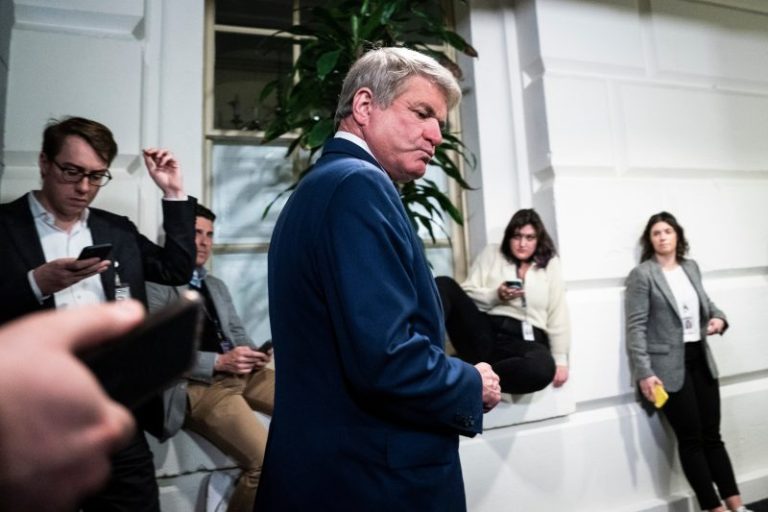During the first impeachment inquiry into President Donald Trump in 2019, former Trump national security aide Fiona Hill made an extraordinary plea. Seated in front of congressional Republicans, she implored them not to spread Russian propaganda.
“In the course of this investigation, I would ask that you please not promote politically driven falsehoods that so clearly advance Russian interests,” she told them. She was referring to comments they had made during her earlier deposition breathing life into a baseless, Trump-backed suggestion that Ukraine, rather than Russia, interfered in the 2016 U.S. election.
“These fictions are harmful even if they’re deployed for purely domestic political purposes,” she added.
Republicans on the committee blanched at the suggestion that they had served as conduits for Russian misinformation, but Hill refused to back down.
Five years later, Republicans are starting to grapple more publicly with the idea that this kind of thing is happening in their ranks.
The most striking example came this week. In an interview with Puck News’s Julia Ioffe, Rep. Michael McCaul (R-Tex.) — none other than the GOP chairman of the House Foreign Affairs Committee — flat-out said that Russian propaganda had “infected a good chunk of my party’s base.”
McCaul suggested conservative media was to blame.
“There are some more nighttime entertainment shows that seem to spin, like, I see the Russian propaganda in some of it — and it’s almost identical [to what they’re saying on Russian state television] — on our airwaves,” McCaul said.
He also cited “these people that read various conspiracy-theory outlets that are just not accurate, and they actually model Russian propaganda.”
Asked which Republicans specifically he was talking about, McCaul said it was “obvious,” before staff intervened and asked that the conversation go off the record.
These comments are the most significant to date, but they’re not the only ones.
A GOP impasse over additional funding for Ukraine’s defense against Russia — combined recently with Tucker Carlson’s deeply weird promotion of Russia and Trump’s comments about not defending NATO allies from Moscow — has apparently occasioned some self-reflection among Republicans about their colleagues and allies:
Former vice president Mike Pence, Sen. Thom Tillis (R-N.C.) and a top aide to Sen. Todd Young (R-Ill.) have warned their party against serving as apologists for Russian President Vladimir Putin.Recent presidential candidate Nikki Haley said Trump’s comments about not defending NATO allies, among others, “empower Putin.”And Sen. John Cornyn (R-Tex.) shot back at criticism from Texas Attorney General Ken Paxton (R) about Cornyn’s support for Ukraine, urging Paxton to “spend less time pushing Russian propaganda.”
Around the same time, former congresswoman Liz Cheney (R-Wyo.) said there is now “a Putin wing of the Republican Party.”
In 2022, Sen. Mitt Romney (R-Utah) called the pro-Putin sentiments in some corners of his party “almost treasonous,” while allowing that perhaps his fellow Republicans were just attention-seekers.
“It’s unthinkable to me, it’s almost treasonous and it just makes me ill to see some of these people do that,” Romney said. “But, of course, they do it because if they get shock value and it’s good to get more eyeballs and maybe make a little more money for them or their network. It’s disgusting.”
And then there is what may be the most famous example: when House GOP leaders in 2016 privately joked about Trump being compromised by Russia, as later reported by The Washington Post.
The day after The Post broke the news that the Russians had hacked the Democratic National Committee, then-House Majority Leader Kevin McCarthy (R-Calif.) quipped that perhaps Russia had gotten Democrats’ opposition research about Trump.
“There’s two people, I think, Putin pays,” McCarthy added, “[Rep. Dana] Rohrabacher and Trump.” (Rohrabacher was an openly pro-Russian Republican from California.)
Then-House Speaker Paul D. Ryan (R-Wis.) quickly tried to steer the conversation in another direction and urged people to be discreet.
It appeared to be a joke, but perhaps a joke born of real concerns about Trump’s commentary on Russia.
Eight years later, such concerns clearly remain for some prominent Republicans about their colleagues and allies.

